Mastering Data Center Management with Expert Consulting
By
Dr. Sudhakar Gummadi
—
min read



Data centers are complex ecosystems that require expert management to deliver optimal performance, efficiency, and reliability.
As technology evolves, the expert consulting comes into play. By leveraging the knowledge and experience of seasoned professionals, organizations can transform their data centers from cost centers into strategic assets that drive business growth.
In this blog, we'll dive deep into the world of data center consulting. We'll explore advanced strategies, evaluate the impact of consulting engagements, and look at future trends shaping the industry.
Arche can be the expert consultant for your data center. Book a call with us to learn how we can help.
Advanced Strategies in Data Center Consulting
The field of data center management is constantly evolving. What worked yesterday might not be sufficient for tomorrow's challenges. Let's explore some of the cutting-edge strategies that expert consultants are using to optimize and innovate in the data center space.
Leading Techniques for Data Center Optimization and Innovation
Advanced Virtualization Techniques
Virtualization has been a game-changer in data center management for years. But the technology continues to evolve, offering new opportunities for optimization. Today's expert consultants are pushing the boundaries of virtualization to squeeze even more performance out of existing hardware.
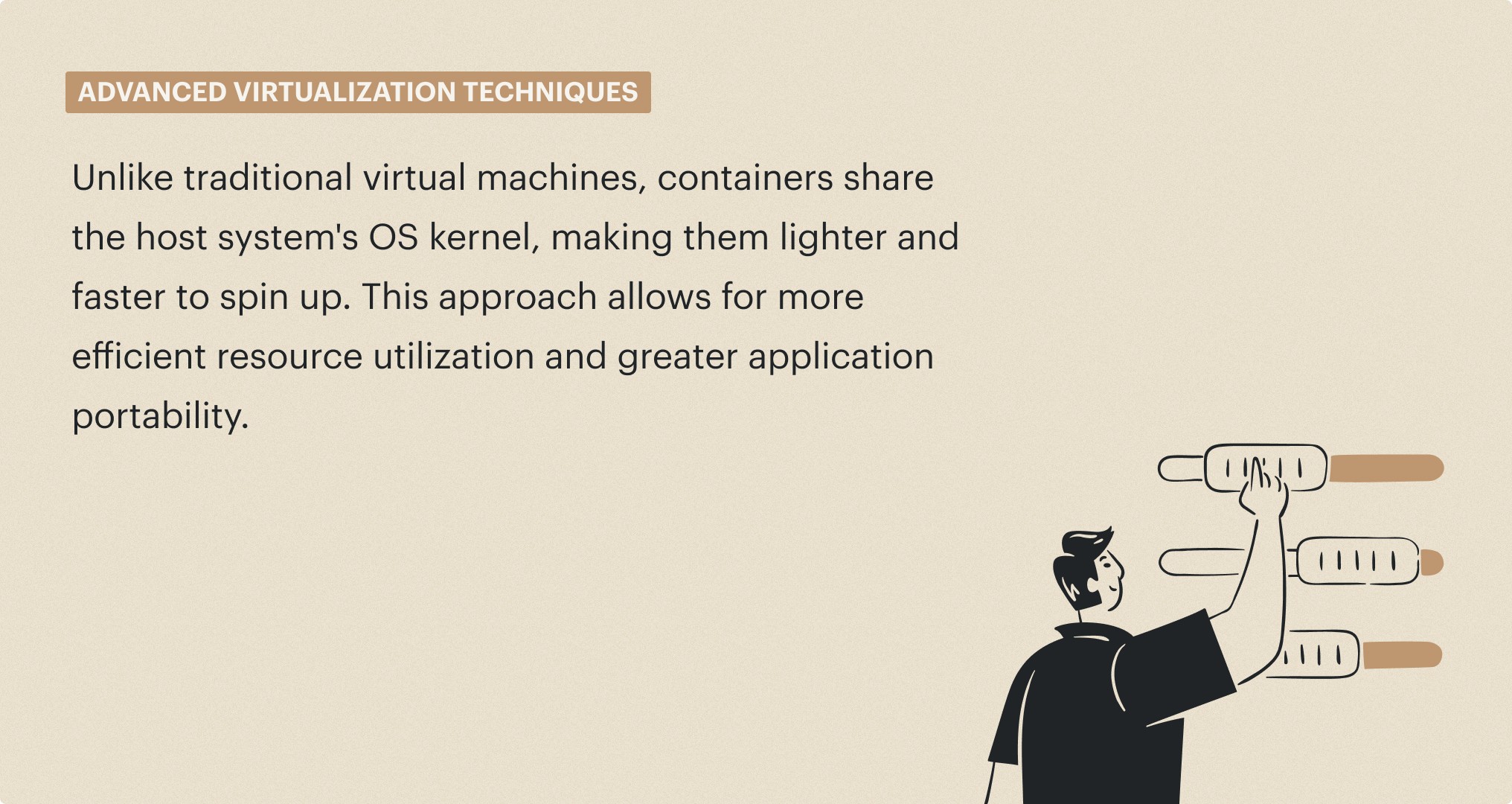
Containerization is one area where we're seeing significant innovation. Unlike traditional virtual machines, containers share the host system's OS kernel, making them lighter and faster to spin up. This approach allows for more efficient resource utilization and greater application portability.
Software-defined networking (SDN) is another powerful tool in the consultant's arsenal. By decoupling network control from the underlying hardware, SDN allows for more flexible and dynamic network management. This can lead to improved performance, easier scalability, and more robust security.
Energy Efficiency and Sustainability
With growing concerns about climate change and rising energy costs, data center energy efficiency has become a top priority. Expert consultants are employing a range of strategies to help organizations reduce their carbon footprint and energy bills.
Liquid cooling is gaining traction as a more efficient alternative to traditional air cooling systems. By using a liquid medium to absorb and dissipate heat, these systems can handle higher power densities and operate more efficiently than air-based solutions.
The adoption of energy-efficient hardware is another key strategy. From high-efficiency power supplies to low-power processors, every component choice can contribute to overall energy savings. Consultants can help organizations navigate the myriad of options to find the best balance between performance and efficiency.
Renewable energy integration is becoming increasingly important in data center design. Some facilities are now incorporating on-site solar panels or wind turbines to offset their energy consumption. Others are partnering with renewable energy providers to ensure a green power supply.
Automation and Orchestration
In the fast-paced world of data center operations, manual processes are often too slow and error-prone to keep up. That's why automation and orchestration have become critical tools for optimizing data center performance.
Expert consultants are implementing advanced automation tools that can handle everything from routine maintenance tasks to complex workload balancing. These systems can monitor performance metrics in real-time, automatically adjusting resources to meet changing demands.
Orchestration takes automation a step further by coordinating multiple automated tasks across different systems. This can streamline complex processes like application deployments or disaster recovery procedures, reducing the risk of human error and improving overall efficiency.
Disaster Recovery and Business Continuity
In an era where data is often a company's most valuable asset, robust disaster recovery and business continuity strategies are non-negotiable. Expert consultants are developing sophisticated approaches to ensure data integrity and minimize downtime in the face of unexpected events.
Cloud-based disaster recovery solutions are becoming increasingly popular. These systems allow organizations to replicate their data and applications to geographically dispersed cloud environments, providing a high level of redundancy and rapid recovery capabilities.
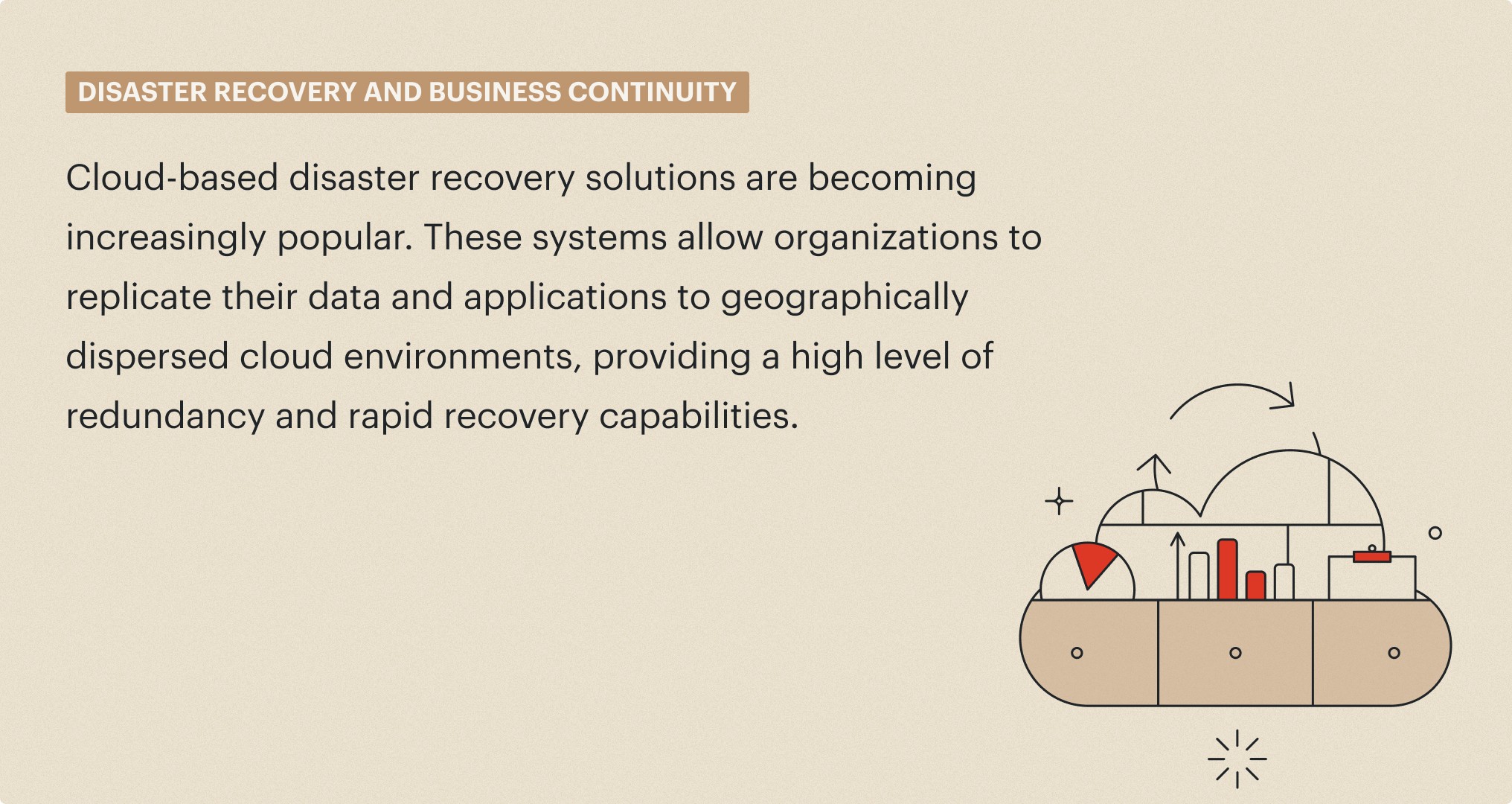
Regular testing of disaster recovery plans is crucial. Consultants are implementing automated testing procedures that can simulate various disaster scenarios without disrupting normal operations. This ensures that recovery plans remain effective as systems and processes evolve.
How Expert Consultants Transform Data Center Operations
Expert consultants bring more than just technical knowledge to the table. They offer a fresh perspective and a wealth of experience that can fundamentally transform how organizations approach data center management.
Tailored Solutions
One size doesn't fit all in data center management. Expert consultants understand this and take a tailored approach to each engagement. They begin by conducting a thorough assessment of an organization's current infrastructure, business goals, and challenges.
This deep dive allows consultants to develop customized strategies that align with the organization's specific needs. Whether it's optimizing performance, reducing costs, or improving scalability, the solutions are designed to deliver maximum value.
Change Management
Implementing new technologies or processes in a data center environment can be challenging. It often requires changes to established workflows and can face resistance from staff accustomed to existing systems.
Expert consultants excel at managing this change process. They work closely with both leadership and front-line staff to ensure smooth transitions. This includes developing comprehensive training programs, creating clear communication channels, and establishing feedback mechanisms to address concerns as they arise.
Performance Measurement
You can't improve what you don't measure. That's why expert consultants place a strong emphasis on establishing key performance indicators (KPIs) and metrics for data center operations.
These metrics go beyond basic uptime and utilization figures. They might include complex measures like application response times, energy efficiency ratios, or cost per transaction. By tracking these KPIs over time, organizations can make data-driven decisions about resource allocation and technology investments.
Cost Optimization
In many organizations, the data center represents a significant cost center. Expert consultants can help turn this around by identifying opportunities for cost savings without compromising performance or reliability.
This might involve strategies like consolidating underutilized servers, negotiating better terms with vendors, or implementing more efficient cooling systems. The goal is to optimize every aspect of data center operations to deliver the best possible return on investment.
Risk Mitigation
Data centers face a wide range of risks, from cybersecurity threats to equipment failures. Expert consultants bring a comprehensive approach to risk management that can help organizations avoid costly disruptions.
This includes implementing robust security measures, developing comprehensive disaster recovery plans, and ensuring compliance with relevant regulations. By taking a proactive approach to risk management, consultants help organizations stay ahead of potential issues before they become critical problems.
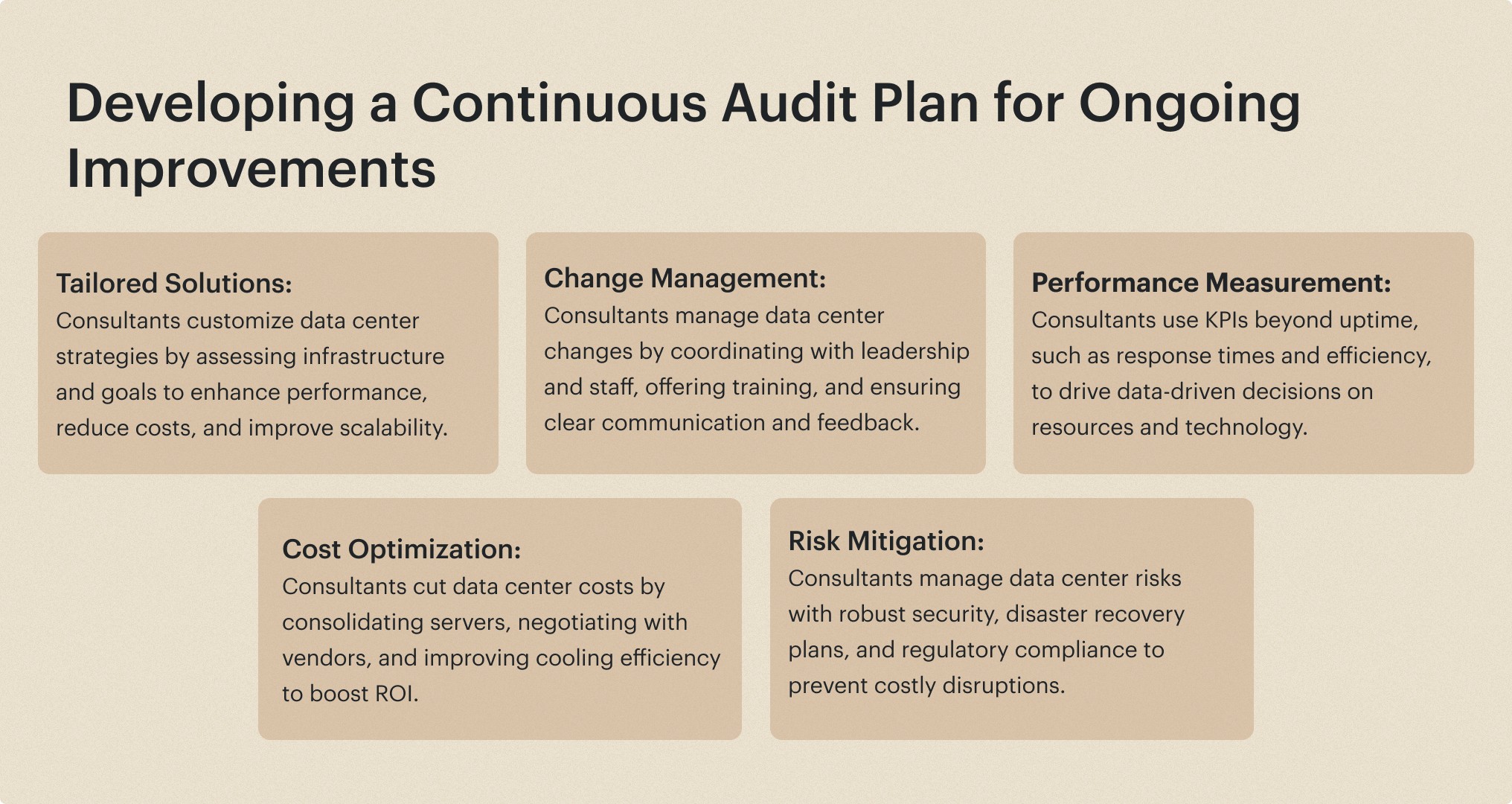
Curious on how consulting can make your data center better? Here's our blog on how expert consulting can provide you with optimum solutions.
Evaluating the Impact of Data Center Consulting
In the world of data centers, expert consulting can be a game-changer. But how do you measure the real impact of these engagements? Let's dive into the methods for evaluating success and understanding the long-term benefits of data center consulting.
Measuring Success and ROI from Consulting Engagements
Determining the success of a consulting engagement isn't always straightforward. It requires a clear understanding of your goals and a systematic approach to measurement.
Start by defining clear success metrics. These should align with your organization's objectives. Are you aiming to reduce operational costs? Improve energy efficiency? Enhance performance? Whatever your goals, make sure they're specific and measurable.
For example, you might set targets like reducing power usage effectiveness (PUE) by 15%, cutting operational costs by 20%, or achieving 99.999% uptime. These concrete goals give you a clear benchmark for success.
Next, focus on quantifying your return on investment (ROI). This involves comparing the cost of consulting services against the financial benefits gained. But remember, not all benefits are easily quantifiable in dollar terms.
Consider both hard and soft returns. Hard returns might include reduced energy costs or decreased hardware expenses due to better utilization. Soft returns could be improved customer satisfaction from faster application performance or enhanced brand reputation from improved sustainability practices.
To get a complete picture, develop a comprehensive ROI model with your consultants. This should account for both immediate and long-term benefits. Don't forget to factor in the potential cost savings from avoided mistakes or inefficiencies that expert guidance can prevent.
Longitudinal studies are another powerful tool for measuring success. The full impact of consulting often unfolds over time. Set up systems to track your key metrics over an extended period. This might involve regular performance audits, ongoing energy consumption monitoring, or periodic cost analyses.
Compare these long-term metrics to your pre-consulting baseline. This will give you a clear picture of the sustained impact of your consulting engagement. It can also help you identify areas where initial improvements may be tapering off, signaling the need for further optimization.
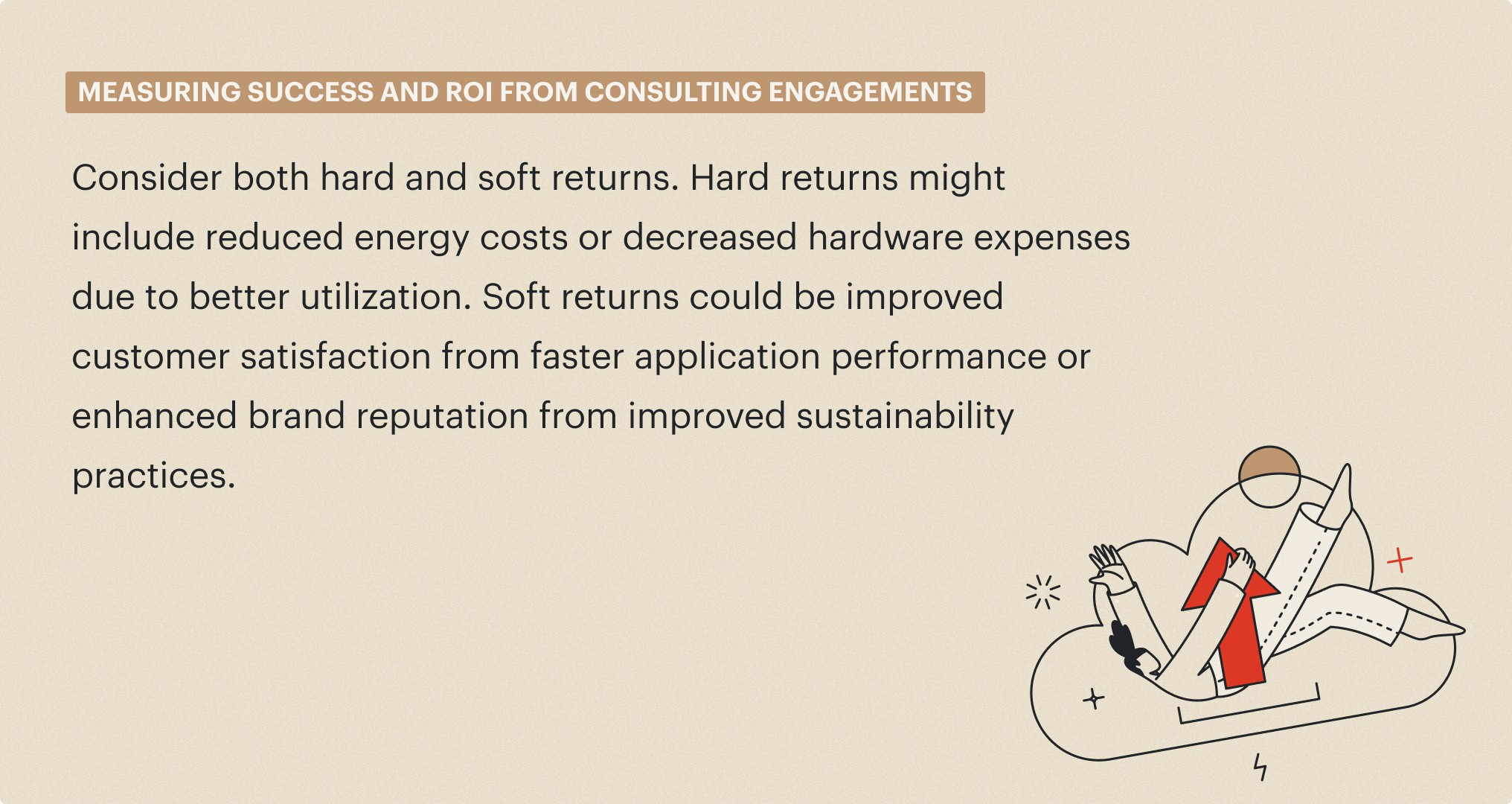
Success isn't a one-time event. It's an ongoing process that requires consistent monitoring and analysis. Regular reviews of your metrics can help you stay on track and make informed decisions about future consulting needs.
Long-term Benefits and Sustainability Through Consulting
While immediate improvements are valuable, the true power of expert consulting often lies in its long-term impact. Let's explore some of the enduring benefits that can result from a successful consulting engagement.
One of the most significant long-term benefits is the establishment of a culture of continuous improvement. Expert consultants don't just implement changes and leave. They work to instill best practices and methodologies that your team can continue to apply long after the engagement ends.
This might involve introducing agile project management techniques, implementing regular performance review processes, or establishing cross-functional teams to drive ongoing optimization efforts. By fostering this culture, consulting engagements can deliver value that extends far beyond the initial project scope.
Strategic partnerships are another potential long-term benefit. Many organizations find that their initial consulting engagement evolves into an ongoing relationship. This can provide continuous access to expert advice and industry insights, helping you stay ahead of emerging trends and challenges.
A strategic consulting partner can act as an extension of your team, providing specialized expertise when you need it. They can help you navigate complex technology decisions, assist with long-term planning, and provide an external perspective on your operations. In the rapidly evolving world of data center technology, this kind of partnership can be invaluable.
Improved scalability is a key long-term benefit of expert consulting. Consultants can help you develop flexible, scalable solutions that adapt to your changing business needs over time. This might involve implementing modular data center designs that can easily expand as your needs grow, or adopting cloud-based solutions that can quickly scale up or down based on demand.
Knowledge transfer is perhaps one of the most valuable long-term benefits of a consulting engagement. Expert consultants bring a wealth of experience and industry best practices, which they can share with your in-house team throughout the engagement.
This knowledge transfer can take many forms. It might include formal training sessions, side-by-side work on projects, or the development of detailed documentation and process guides. By focusing on knowledge transfer, consulting engagements can help build your organization's internal capabilities, reducing your reliance on external expertise over time.
Sustainability is another area where consulting can deliver long-term benefits. Expert consultants can help you develop and implement sustainable data center practices that benefit both your bottom line and the environment. This might involve strategies like optimizing energy efficiency, implementing renewable energy solutions, or adopting circular economy principles in your hardware lifecycle management.
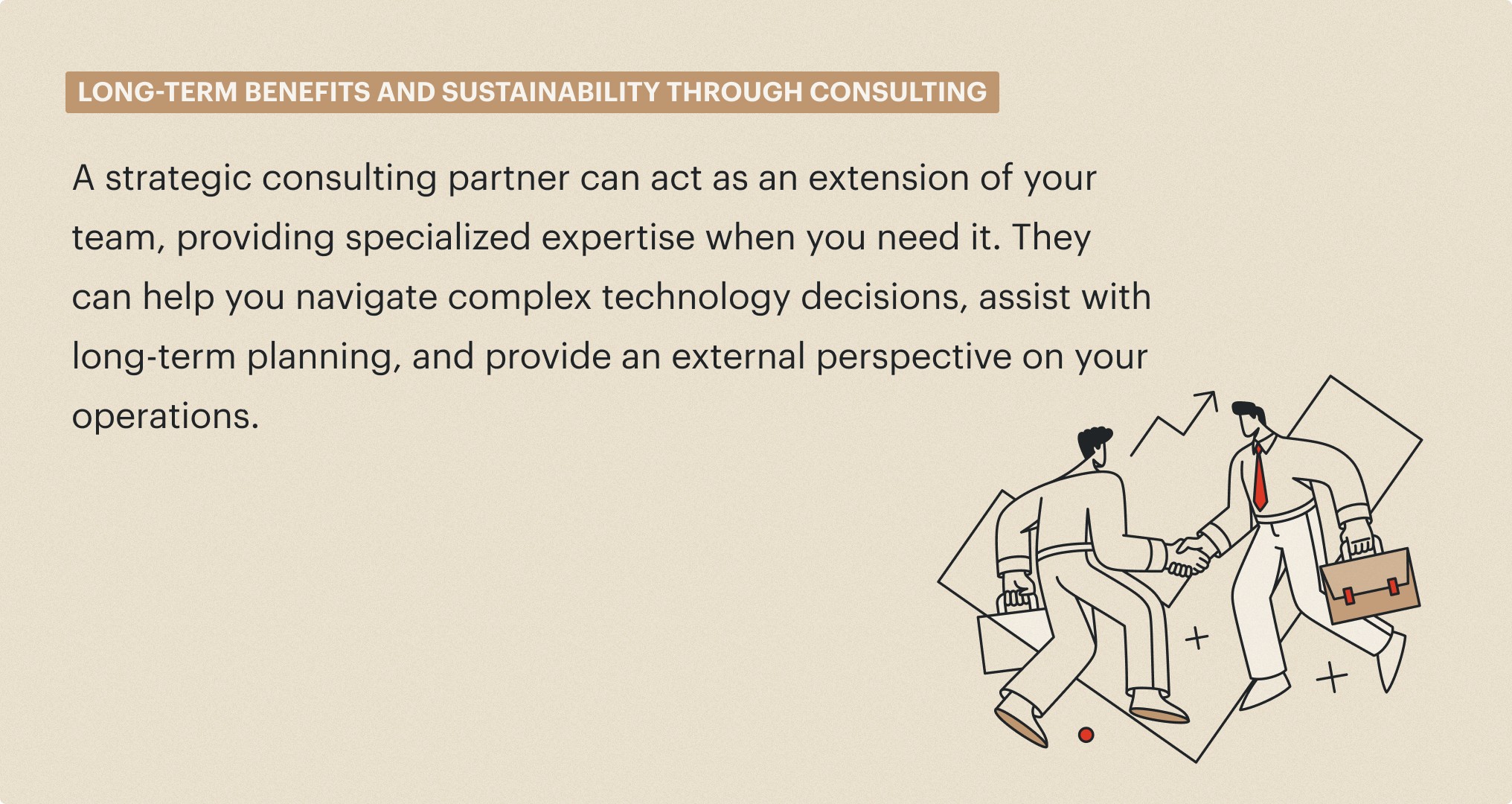
Finally, expert consulting can provide long-term benefits in terms of risk mitigation. By helping you implement robust security measures, develop comprehensive disaster recovery plans, and ensure compliance with relevant regulations, consultants can significantly reduce your exposure to potential risks.
This risk mitigation extends beyond just avoiding negative outcomes. It can also open up new opportunities for your organization. For example, having strong data protection measures in place might allow you to pursue business in highly regulated industries that you couldn't previously serve.
Future Trends in Data Center Consulting
The world of data center technology is evolving at a breakneck pace. As we look to the future, it's clear that data center consultants will need to stay ahead of emerging trends to provide valuable insights and guidance to their clients. Let's explore some of the key trends shaping the future of data center consulting and the skills consultants will need to thrive in this changing landscape.
Anticipating Changes in Data Center Technologies and Consulting Needs
Increased Adoption of AI and Machine Learning
Artificial Intelligence (AI) and Machine Learning (ML) are no longer just buzzwords. They're becoming integral to data center operations. As these technologies mature, we're seeing their application in various aspects of data center management.
Predictive maintenance is one area where AI is making a significant impact. By analyzing vast amounts of operational data, AI systems can predict equipment failures before they occur. This allows for proactive maintenance, reducing downtime and extending the lifespan of critical infrastructure.
AI is also being used to optimize data center operations in real-time. From adjusting cooling systems based on workload and environmental conditions to dynamically allocating computing resources, AI-driven systems are taking data center efficiency to new levels.
For consultants, this trend means developing a deep understanding of AI and ML technologies and their practical applications in data center environments. It also requires the ability to help clients navigate the complex landscape of AI vendors and solutions.
Shift Towards Edge Computing
The rise of Internet of Things (IoT) devices and the increasing demand for low-latency applications are driving a shift towards edge computing. This decentralized approach to data processing brings computing power closer to where data is generated and consumed.
Edge computing presents new challenges for data center design and management. Consultants will need to help clients develop strategies for deploying and managing distributed edge data centers while maintaining centralized control and security.
This trend also intersects with the growing importance of 5G networks. As 5G rollout continues, it will enable more sophisticated edge computing applications, further driving the need for distributed data center infrastructure.
Focus on Cybersecurity
As data centers become more complex and interconnected, cybersecurity concerns are taking center stage. The threat landscape is constantly evolving, with new vulnerabilities and attack vectors emerging regularly.
Data center consultants will need to stay at the forefront of cybersecurity trends and best practices. This includes understanding the latest security technologies, from advanced firewalls and intrusion detection systems to AI-powered threat analysis tools.
Moreover, consultants will need to help clients navigate the complex world of compliance and data protection regulations. As governments around the world implement stricter data privacy laws, ensuring compliance while maintaining operational efficiency will be a key challenge.
Sustainability and Green Energy
Environmental concerns are driving a push towards more sustainable data center practices. This goes beyond just improving energy efficiency. There's a growing focus on reducing the overall environmental impact of data centers throughout their lifecycle.
Consultants will need to advise on strategies for integrating renewable energy sources, implementing circular economy principles in hardware lifecycle management, and designing data centers with minimal environmental impact.
This trend also involves helping clients navigate the complex landscape of environmental regulations and certifications. As governments implement stricter environmental policies, compliance will become an increasingly important aspect of data center operations.
Quantum Computing Readiness
While still in its early stages, quantum computing has the potential to revolutionize certain types of data processing. Forward-thinking organizations are already considering how to prepare their data centers for the quantum era.
Consultants will need to help clients understand the potential impacts of quantum computing on their operations. This includes advising on quantum-safe encryption methods to protect against future quantum-enabled security threats.
Preparing for the Future: Skills and Strategies for Tomorrow's Consultants
As the data center landscape evolves, consultants will need to adapt and develop new skills to meet changing client needs. Here are some key areas where tomorrow's consultants should focus their development efforts:
Cross-Domain Expertise
The lines between different IT domains are blurring. Tomorrow's consultants will need to develop expertise across multiple areas, including IT infrastructure, facilities management, cybersecurity, and business strategy.
This holistic understanding will allow consultants to provide more comprehensive and valuable insights to their clients. It will also enable them to better navigate the complex interactions between different aspects of data center operations.
Data Analytics Proficiency
With the increasing importance of data-driven decision making, consultants will need strong skills in data analytics. This goes beyond just understanding how to use analytics tools. It involves the ability to interpret complex datasets, identify meaningful patterns, and translate insights into actionable recommendations.
Consultants should familiarize themselves with advanced analytics techniques, including predictive modeling and machine learning algorithms. They should also develop skills in data visualization to effectively communicate insights to clients.
Soft Skills and Communication
As data center operations become more closely tied to overall business strategy, consultants will need to effectively communicate with both technical teams and C-level executives. This requires the ability to translate complex technical concepts into business terms and vice versa.
Consultants should focus on developing their presentation skills, both written and verbal. They should also work on their ability to build relationships and navigate the often complex organizational structures of their clients.
Continuous Learning
Given the rapid pace of technological change, a commitment to continuous learning is perhaps the most important skill for future consultants. This involves staying up-to-date with the latest industry trends, emerging technologies, and best practices.
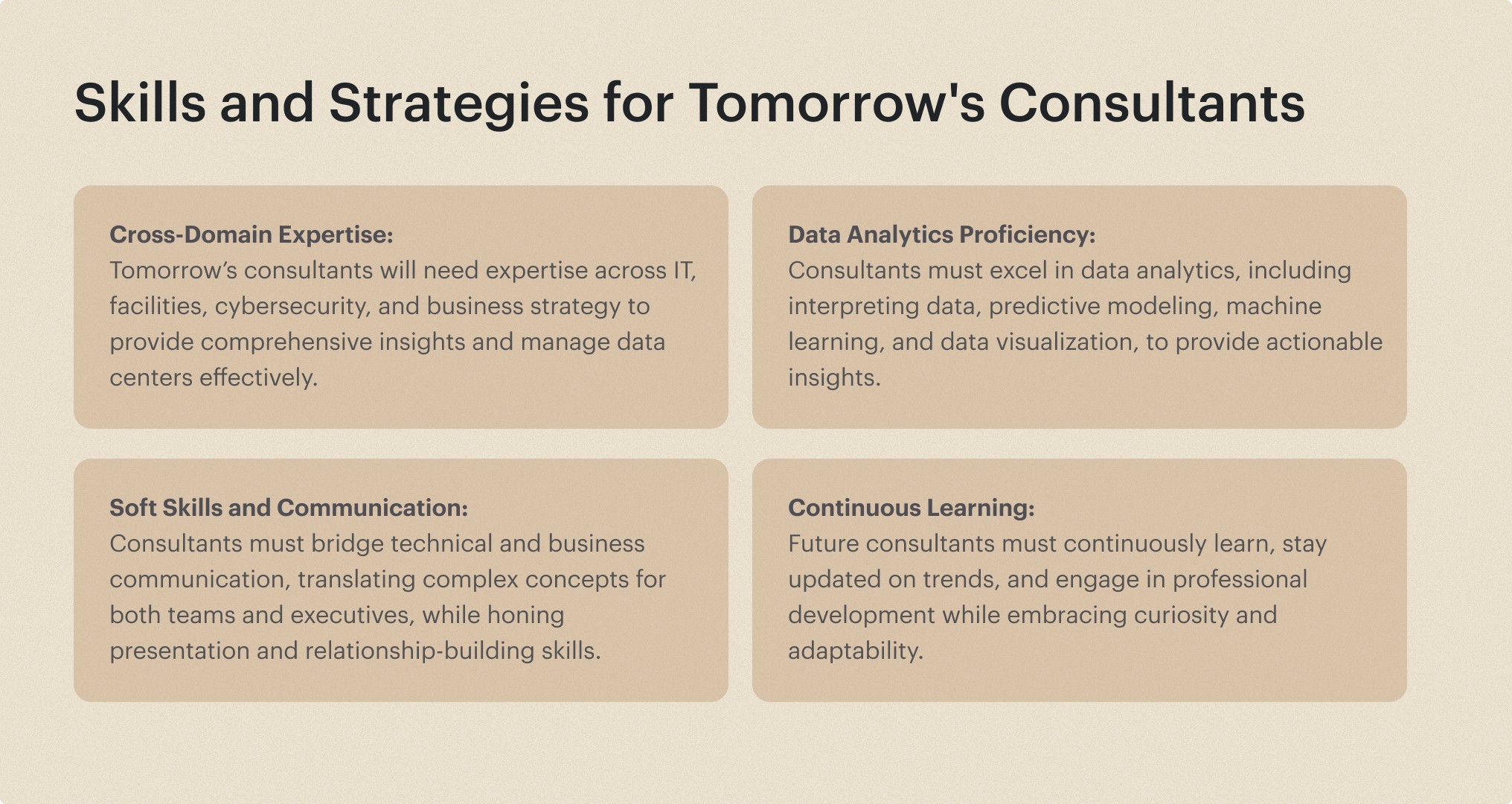
Consultants should make a habit of regularly attending industry conferences, participating in professional development courses, and engaging with peer networks. They should also cultivate a mindset of curiosity and adaptability, always looking for new ways to solve problems and add value for their clients.
How Arche AI Can Help
At Arche AI, we're committed to staying at the forefront of data center consulting. Our team of experts is constantly updating their skills and knowledge to meet the evolving needs of our clients.
We offer a comprehensive range of data center consulting services, from initial assessments and strategy development to implementation support and ongoing optimization. Our approach is always tailored to the unique needs of each client, ensuring that we deliver solutions that drive real business value.
Our expertise spans the full spectrum of data center technologies and trends, including:
Advanced virtualization and containerization strategies
AI and machine learning implementation
Edge computing and distributed infrastructure management
Cybersecurity and compliance
Sustainability and green energy solutions
Quantum computing readiness
We pride ourselves on our ability to translate complex technical concepts into clear, actionable insights for our clients. Whether you're looking to optimize your existing data center operations, plan for future growth, or navigate the complex landscape of emerging technologies, Arche AI has the expertise and experience to guide you every step of the way.
Our commitment to our clients doesn't end with the completion of a project. We believe in building long-term partnerships, providing ongoing support and guidance as your needs evolve. We're not just consultants – we're your partners in navigating the future of data center technology.
Ready to take your data center operations to the next level? Contact us today to learn how our expert consulting services can help you achieve your goals and stay ahead in the rapidly evolving world of data center technology.
Written by
Dr. Sudhakar Gummadi
Director – Consulting Services
Dr. Sudhakar Gummadi holds a Doctorate Degree and 35+ years' expertise to drive business innovation. Specializing in information security, networking, and risk management, he excels in multiplatform enterprise security, compliance, and data centers. His contributions extend to industrial automation, laboratory installations, and teaching post-graduate level courses in Network Engineering, Network Security, and more.
BLOGS
Data Center


Engaging with Data Center Consultants for Optimal Solutions
Aug 14, 2024
—
12 min read
Data Center


Introduction to Data Center Certifications: An Overview
Aug 14, 2024
—
14 min read
Data Center


Mastering Data Center Operations with Advanced Certifications
Aug 14, 2024
—
12 min read
Data Center


Pursuing Data Center Certifications: A Guide for Professionals
Aug 14, 2024
—
12 min read
Ready to take your company to the next level?
Transformation starts here, talk to our experts

© Copyright 2024 Arche AI Pvt. Ltd.
Ready to take your company to the next level?
Transformation starts here, talk to our experts

© Copyright 2024 Arche AI Pvt. Ltd.
Ready to take your company to the next level?
Transformation starts here, talk to our experts

© Copyright 2024 Arche AI Pvt. Ltd.
Ready to take your company to the next level?
Transformation starts here, talk to our experts

© Copyright 2024 Arche AI Pvt. Ltd.
BLOG
Mastering Data Center Management with Expert Consulting
BY
Dr. Sudhakar Gummadi
—
13
min read


Data centers are complex ecosystems that require expert management to deliver optimal performance, efficiency, and reliability.
As technology evolves, the expert consulting comes into play. By leveraging the knowledge and experience of seasoned professionals, organizations can transform their data centers from cost centers into strategic assets that drive business growth.
In this blog, we'll dive deep into the world of data center consulting. We'll explore advanced strategies, evaluate the impact of consulting engagements, and look at future trends shaping the industry.
Arche can be the expert consultant for your data center. Book a call with us to learn how we can help.
Advanced Strategies in Data Center Consulting
The field of data center management is constantly evolving. What worked yesterday might not be sufficient for tomorrow's challenges. Let's explore some of the cutting-edge strategies that expert consultants are using to optimize and innovate in the data center space.
Leading Techniques for Data Center Optimization and Innovation
Advanced Virtualization Techniques
Virtualization has been a game-changer in data center management for years. But the technology continues to evolve, offering new opportunities for optimization. Today's expert consultants are pushing the boundaries of virtualization to squeeze even more performance out of existing hardware.

Containerization is one area where we're seeing significant innovation. Unlike traditional virtual machines, containers share the host system's OS kernel, making them lighter and faster to spin up. This approach allows for more efficient resource utilization and greater application portability.
Software-defined networking (SDN) is another powerful tool in the consultant's arsenal. By decoupling network control from the underlying hardware, SDN allows for more flexible and dynamic network management. This can lead to improved performance, easier scalability, and more robust security.
Energy Efficiency and Sustainability
With growing concerns about climate change and rising energy costs, data center energy efficiency has become a top priority. Expert consultants are employing a range of strategies to help organizations reduce their carbon footprint and energy bills.
Liquid cooling is gaining traction as a more efficient alternative to traditional air cooling systems. By using a liquid medium to absorb and dissipate heat, these systems can handle higher power densities and operate more efficiently than air-based solutions.
The adoption of energy-efficient hardware is another key strategy. From high-efficiency power supplies to low-power processors, every component choice can contribute to overall energy savings. Consultants can help organizations navigate the myriad of options to find the best balance between performance and efficiency.
Renewable energy integration is becoming increasingly important in data center design. Some facilities are now incorporating on-site solar panels or wind turbines to offset their energy consumption. Others are partnering with renewable energy providers to ensure a green power supply.
Automation and Orchestration
In the fast-paced world of data center operations, manual processes are often too slow and error-prone to keep up. That's why automation and orchestration have become critical tools for optimizing data center performance.
Expert consultants are implementing advanced automation tools that can handle everything from routine maintenance tasks to complex workload balancing. These systems can monitor performance metrics in real-time, automatically adjusting resources to meet changing demands.
Orchestration takes automation a step further by coordinating multiple automated tasks across different systems. This can streamline complex processes like application deployments or disaster recovery procedures, reducing the risk of human error and improving overall efficiency.
Disaster Recovery and Business Continuity
In an era where data is often a company's most valuable asset, robust disaster recovery and business continuity strategies are non-negotiable. Expert consultants are developing sophisticated approaches to ensure data integrity and minimize downtime in the face of unexpected events.
Cloud-based disaster recovery solutions are becoming increasingly popular. These systems allow organizations to replicate their data and applications to geographically dispersed cloud environments, providing a high level of redundancy and rapid recovery capabilities.

Regular testing of disaster recovery plans is crucial. Consultants are implementing automated testing procedures that can simulate various disaster scenarios without disrupting normal operations. This ensures that recovery plans remain effective as systems and processes evolve.
How Expert Consultants Transform Data Center Operations
Expert consultants bring more than just technical knowledge to the table. They offer a fresh perspective and a wealth of experience that can fundamentally transform how organizations approach data center management.
Tailored Solutions
One size doesn't fit all in data center management. Expert consultants understand this and take a tailored approach to each engagement. They begin by conducting a thorough assessment of an organization's current infrastructure, business goals, and challenges.
This deep dive allows consultants to develop customized strategies that align with the organization's specific needs. Whether it's optimizing performance, reducing costs, or improving scalability, the solutions are designed to deliver maximum value.
Change Management
Implementing new technologies or processes in a data center environment can be challenging. It often requires changes to established workflows and can face resistance from staff accustomed to existing systems.
Expert consultants excel at managing this change process. They work closely with both leadership and front-line staff to ensure smooth transitions. This includes developing comprehensive training programs, creating clear communication channels, and establishing feedback mechanisms to address concerns as they arise.
Performance Measurement
You can't improve what you don't measure. That's why expert consultants place a strong emphasis on establishing key performance indicators (KPIs) and metrics for data center operations.
These metrics go beyond basic uptime and utilization figures. They might include complex measures like application response times, energy efficiency ratios, or cost per transaction. By tracking these KPIs over time, organizations can make data-driven decisions about resource allocation and technology investments.
Cost Optimization
In many organizations, the data center represents a significant cost center. Expert consultants can help turn this around by identifying opportunities for cost savings without compromising performance or reliability.
This might involve strategies like consolidating underutilized servers, negotiating better terms with vendors, or implementing more efficient cooling systems. The goal is to optimize every aspect of data center operations to deliver the best possible return on investment.
Risk Mitigation
Data centers face a wide range of risks, from cybersecurity threats to equipment failures. Expert consultants bring a comprehensive approach to risk management that can help organizations avoid costly disruptions.
This includes implementing robust security measures, developing comprehensive disaster recovery plans, and ensuring compliance with relevant regulations. By taking a proactive approach to risk management, consultants help organizations stay ahead of potential issues before they become critical problems.

Curious on how consulting can make your data center better? Here's our blog on how expert consulting can provide you with optimum solutions.
Evaluating the Impact of Data Center Consulting
In the world of data centers, expert consulting can be a game-changer. But how do you measure the real impact of these engagements? Let's dive into the methods for evaluating success and understanding the long-term benefits of data center consulting.
Measuring Success and ROI from Consulting Engagements
Determining the success of a consulting engagement isn't always straightforward. It requires a clear understanding of your goals and a systematic approach to measurement.
Start by defining clear success metrics. These should align with your organization's objectives. Are you aiming to reduce operational costs? Improve energy efficiency? Enhance performance? Whatever your goals, make sure they're specific and measurable.
For example, you might set targets like reducing power usage effectiveness (PUE) by 15%, cutting operational costs by 20%, or achieving 99.999% uptime. These concrete goals give you a clear benchmark for success.
Next, focus on quantifying your return on investment (ROI). This involves comparing the cost of consulting services against the financial benefits gained. But remember, not all benefits are easily quantifiable in dollar terms.
Consider both hard and soft returns. Hard returns might include reduced energy costs or decreased hardware expenses due to better utilization. Soft returns could be improved customer satisfaction from faster application performance or enhanced brand reputation from improved sustainability practices.
To get a complete picture, develop a comprehensive ROI model with your consultants. This should account for both immediate and long-term benefits. Don't forget to factor in the potential cost savings from avoided mistakes or inefficiencies that expert guidance can prevent.
Longitudinal studies are another powerful tool for measuring success. The full impact of consulting often unfolds over time. Set up systems to track your key metrics over an extended period. This might involve regular performance audits, ongoing energy consumption monitoring, or periodic cost analyses.
Compare these long-term metrics to your pre-consulting baseline. This will give you a clear picture of the sustained impact of your consulting engagement. It can also help you identify areas where initial improvements may be tapering off, signaling the need for further optimization.

Success isn't a one-time event. It's an ongoing process that requires consistent monitoring and analysis. Regular reviews of your metrics can help you stay on track and make informed decisions about future consulting needs.
Long-term Benefits and Sustainability Through Consulting
While immediate improvements are valuable, the true power of expert consulting often lies in its long-term impact. Let's explore some of the enduring benefits that can result from a successful consulting engagement.
One of the most significant long-term benefits is the establishment of a culture of continuous improvement. Expert consultants don't just implement changes and leave. They work to instill best practices and methodologies that your team can continue to apply long after the engagement ends.
This might involve introducing agile project management techniques, implementing regular performance review processes, or establishing cross-functional teams to drive ongoing optimization efforts. By fostering this culture, consulting engagements can deliver value that extends far beyond the initial project scope.
Strategic partnerships are another potential long-term benefit. Many organizations find that their initial consulting engagement evolves into an ongoing relationship. This can provide continuous access to expert advice and industry insights, helping you stay ahead of emerging trends and challenges.
A strategic consulting partner can act as an extension of your team, providing specialized expertise when you need it. They can help you navigate complex technology decisions, assist with long-term planning, and provide an external perspective on your operations. In the rapidly evolving world of data center technology, this kind of partnership can be invaluable.
Improved scalability is a key long-term benefit of expert consulting. Consultants can help you develop flexible, scalable solutions that adapt to your changing business needs over time. This might involve implementing modular data center designs that can easily expand as your needs grow, or adopting cloud-based solutions that can quickly scale up or down based on demand.
Knowledge transfer is perhaps one of the most valuable long-term benefits of a consulting engagement. Expert consultants bring a wealth of experience and industry best practices, which they can share with your in-house team throughout the engagement.
This knowledge transfer can take many forms. It might include formal training sessions, side-by-side work on projects, or the development of detailed documentation and process guides. By focusing on knowledge transfer, consulting engagements can help build your organization's internal capabilities, reducing your reliance on external expertise over time.
Sustainability is another area where consulting can deliver long-term benefits. Expert consultants can help you develop and implement sustainable data center practices that benefit both your bottom line and the environment. This might involve strategies like optimizing energy efficiency, implementing renewable energy solutions, or adopting circular economy principles in your hardware lifecycle management.

Finally, expert consulting can provide long-term benefits in terms of risk mitigation. By helping you implement robust security measures, develop comprehensive disaster recovery plans, and ensure compliance with relevant regulations, consultants can significantly reduce your exposure to potential risks.
This risk mitigation extends beyond just avoiding negative outcomes. It can also open up new opportunities for your organization. For example, having strong data protection measures in place might allow you to pursue business in highly regulated industries that you couldn't previously serve.
Future Trends in Data Center Consulting
The world of data center technology is evolving at a breakneck pace. As we look to the future, it's clear that data center consultants will need to stay ahead of emerging trends to provide valuable insights and guidance to their clients. Let's explore some of the key trends shaping the future of data center consulting and the skills consultants will need to thrive in this changing landscape.
Anticipating Changes in Data Center Technologies and Consulting Needs
Increased Adoption of AI and Machine Learning
Artificial Intelligence (AI) and Machine Learning (ML) are no longer just buzzwords. They're becoming integral to data center operations. As these technologies mature, we're seeing their application in various aspects of data center management.
Predictive maintenance is one area where AI is making a significant impact. By analyzing vast amounts of operational data, AI systems can predict equipment failures before they occur. This allows for proactive maintenance, reducing downtime and extending the lifespan of critical infrastructure.
AI is also being used to optimize data center operations in real-time. From adjusting cooling systems based on workload and environmental conditions to dynamically allocating computing resources, AI-driven systems are taking data center efficiency to new levels.
For consultants, this trend means developing a deep understanding of AI and ML technologies and their practical applications in data center environments. It also requires the ability to help clients navigate the complex landscape of AI vendors and solutions.
Shift Towards Edge Computing
The rise of Internet of Things (IoT) devices and the increasing demand for low-latency applications are driving a shift towards edge computing. This decentralized approach to data processing brings computing power closer to where data is generated and consumed.
Edge computing presents new challenges for data center design and management. Consultants will need to help clients develop strategies for deploying and managing distributed edge data centers while maintaining centralized control and security.
This trend also intersects with the growing importance of 5G networks. As 5G rollout continues, it will enable more sophisticated edge computing applications, further driving the need for distributed data center infrastructure.
Focus on Cybersecurity
As data centers become more complex and interconnected, cybersecurity concerns are taking center stage. The threat landscape is constantly evolving, with new vulnerabilities and attack vectors emerging regularly.
Data center consultants will need to stay at the forefront of cybersecurity trends and best practices. This includes understanding the latest security technologies, from advanced firewalls and intrusion detection systems to AI-powered threat analysis tools.
Moreover, consultants will need to help clients navigate the complex world of compliance and data protection regulations. As governments around the world implement stricter data privacy laws, ensuring compliance while maintaining operational efficiency will be a key challenge.
Sustainability and Green Energy
Environmental concerns are driving a push towards more sustainable data center practices. This goes beyond just improving energy efficiency. There's a growing focus on reducing the overall environmental impact of data centers throughout their lifecycle.
Consultants will need to advise on strategies for integrating renewable energy sources, implementing circular economy principles in hardware lifecycle management, and designing data centers with minimal environmental impact.
This trend also involves helping clients navigate the complex landscape of environmental regulations and certifications. As governments implement stricter environmental policies, compliance will become an increasingly important aspect of data center operations.
Quantum Computing Readiness
While still in its early stages, quantum computing has the potential to revolutionize certain types of data processing. Forward-thinking organizations are already considering how to prepare their data centers for the quantum era.
Consultants will need to help clients understand the potential impacts of quantum computing on their operations. This includes advising on quantum-safe encryption methods to protect against future quantum-enabled security threats.
Preparing for the Future: Skills and Strategies for Tomorrow's Consultants
As the data center landscape evolves, consultants will need to adapt and develop new skills to meet changing client needs. Here are some key areas where tomorrow's consultants should focus their development efforts:
Cross-Domain Expertise
The lines between different IT domains are blurring. Tomorrow's consultants will need to develop expertise across multiple areas, including IT infrastructure, facilities management, cybersecurity, and business strategy.
This holistic understanding will allow consultants to provide more comprehensive and valuable insights to their clients. It will also enable them to better navigate the complex interactions between different aspects of data center operations.
Data Analytics Proficiency
With the increasing importance of data-driven decision making, consultants will need strong skills in data analytics. This goes beyond just understanding how to use analytics tools. It involves the ability to interpret complex datasets, identify meaningful patterns, and translate insights into actionable recommendations.
Consultants should familiarize themselves with advanced analytics techniques, including predictive modeling and machine learning algorithms. They should also develop skills in data visualization to effectively communicate insights to clients.
Soft Skills and Communication
As data center operations become more closely tied to overall business strategy, consultants will need to effectively communicate with both technical teams and C-level executives. This requires the ability to translate complex technical concepts into business terms and vice versa.
Consultants should focus on developing their presentation skills, both written and verbal. They should also work on their ability to build relationships and navigate the often complex organizational structures of their clients.
Continuous Learning
Given the rapid pace of technological change, a commitment to continuous learning is perhaps the most important skill for future consultants. This involves staying up-to-date with the latest industry trends, emerging technologies, and best practices.

Consultants should make a habit of regularly attending industry conferences, participating in professional development courses, and engaging with peer networks. They should also cultivate a mindset of curiosity and adaptability, always looking for new ways to solve problems and add value for their clients.
How Arche AI Can Help
At Arche AI, we're committed to staying at the forefront of data center consulting. Our team of experts is constantly updating their skills and knowledge to meet the evolving needs of our clients.
We offer a comprehensive range of data center consulting services, from initial assessments and strategy development to implementation support and ongoing optimization. Our approach is always tailored to the unique needs of each client, ensuring that we deliver solutions that drive real business value.
Our expertise spans the full spectrum of data center technologies and trends, including:
Advanced virtualization and containerization strategies
AI and machine learning implementation
Edge computing and distributed infrastructure management
Cybersecurity and compliance
Sustainability and green energy solutions
Quantum computing readiness
We pride ourselves on our ability to translate complex technical concepts into clear, actionable insights for our clients. Whether you're looking to optimize your existing data center operations, plan for future growth, or navigate the complex landscape of emerging technologies, Arche AI has the expertise and experience to guide you every step of the way.
Our commitment to our clients doesn't end with the completion of a project. We believe in building long-term partnerships, providing ongoing support and guidance as your needs evolve. We're not just consultants – we're your partners in navigating the future of data center technology.
Ready to take your data center operations to the next level? Contact us today to learn how our expert consulting services can help you achieve your goals and stay ahead in the rapidly evolving world of data center technology.
Dr. Sudhakar Gummadi holds a Doctorate Degree and 35+ years' expertise to drive business innovation. Specializing in information security, networking, and risk management, he excels in multiplatform enterprise security, compliance, and data centers. His contributions extend to industrial automation, laboratory installations, and teaching post-graduate level courses in Network Engineering, Network Security, and more.
Partner with us
Unlock your business potential with our committed team driving your success.
Read these next


Data Center
Engaging with Data Center Consultants for Optimal Solutions
From improving energy efficiency and reducing operating costs to enhancing security and planning for future growth, the right consultant can unlock opportunities that drive business value.
Read now ➝


Data Center
Introduction to Data Center Certifications: An Overview
For both data center professionals and the facilities they manage, the lack of industry-recognized certifications can cause a chain reaction of problems. We solve the pain in this blog.
Read now ➝


Data Center
Mastering Data Center Operations with Advanced Certifications
Advanced certifications not only validate your team's expertise but also drive operational excellence, boost efficiency, and position your organization for sustained success in an ever-competitive market.
Read now ➝
Ready to take your company to the next level?
Transformation starts here, talk to our experts

© Copyright 2024 Arche AI Pvt. Ltd.
Ready to take your company to the next level?
Transformation starts here, talk to our experts

© Copyright 2024 Arche AI Pvt. Ltd.







